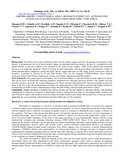The Role of Africa Standby Force in Securing Africa: a Case of the Eastern Africa Standby Force
Abstract
The research attempts to proffer solution to an armed conflict whose perpetuity is crippling and stifling Africa‟s peace, security and sustainable developmental thrust. Using both qualitative and quantitative research methods through interviews and questionnaires respectively, and buoyed by an encompassing literature review the research set-out to proffer solution in arresting recurrent armed conflict in eastern Congo. The solution is the role of East African Standby Force (EASF) and the SADC Standby Force (SSF) under the authority and command of the African Standby Force (ASF); can play in dealing with armed conflict in Kivu. The collective security theory was used to provide a guideline and framework within which the envisioned synergy of regional Forces can work in bringing to an end an armed conflict that has spelt-out dire consequences towards African aspirations towards development. The researcher concluded that; African mechanisms towards peace and security need to be given all the internal support Africa through the African Union (AU) can muster in making the ASF viable, vibrant and vigilant in attending to Africa‟s endemic crises such as the continued unrest in Kivu. Further, the researcher argues that; “bringing an end to the Kivu unrest will bode well for African aspirations towards meeting her developmental pathway ensconced in declarations such as Agenda 2063”. Finally, the researcher calls on the AU to institute contributions of US$ 2 million each from Member States towards making Africa less reliant on foreign funding. The contributions are reasonable and within the capacity of AU Member States to contribute towards the realization of making the ASF a reality. US$ 2 million is a modest figure, considering how much money Africa‟s economies lose out through international crime, for example. Thus, it is the thrust of this paper to advocate the institution of home-grown solutions to home-grown problems.
Publisher
university of nairobi
Rights
Attribution-NonCommercial-NoDerivs 3.0 United StatesUsage Rights
http://creativecommons.org/licenses/by-nc-nd/3.0/us/Collections
The following license files are associated with this item:
Except where otherwise noted, this item's license is described as Attribution-NonCommercial-NoDerivs 3.0 United States
Related items
Showing items related by title, author, creator and subject.
-
"Some Issues in Micro and Small Scale Enterprises in the Informal Sector in Africa". Paper distributed at the Asia-Africa Expert Group Meeting on Improving Productivity and Competitiveness of the Informal Sector in Africa (Banjul, December 1998).
Mureithi, L P (University of NairobiSchool of Economics, 1998-12) -
Genomic approaches to the burden of kidney disease in Sub-Saharan Africa: the Human Heredity and Health in Africa (H3Africa) Kidney Disease Research Network.
Osafo, C; Raji, YR; Olanrewaju, T; Mamven, M; Arogundade, F; Ajayi, S; Ulasi, I; Salako, B; Plange-Rhule, J; Mengistu, Y; Mc'Ligeyo, SO; Moturi, G; Winkler, CA; Moxey-Mims, MM; Rasooly, RS; Kimmel, P; Adu, D; Ojo, A; Parekh, RS (University of Nairobi, 2017) -
Meeting report: UNESCO-MERCK Africa research summit 2015- accelerating access and sustaining innovation ‘from Africa for Africa’
Omange, R.W.; Ocholla, A.O.; Kwallah, A.O; Kageha, N; Mwangi, 3; Cherutich, R. K; Odeny, T.A; Nzomo, T; Angwenyi, S; Yonga, P; Kariuki, F.; Kyalo, M.; Mutai, P.C.; Nindo, F; Songok, E.M (University of Nairobi, 2017)Background: The Ebola virus disease outbreak of 2014 was the largest, longest and most devastating in the history of the disease. It demonstrated the social and economic impact an emerging infectious disease can have in ...




